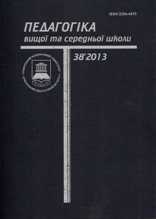The Implementation Of Inclusive Education In Great Britain: Obstacles, Future Challenges
DOI:
https://doi.org/10.31812/educdim.v39i0.3077Keywords:
inclusion, special education, system of educationAbstract
Davydenko H. V. The Implementation Of Inclusive Education In Great Britain: Obstacles, Future Challenges.
The results of analysis of basic problems of inclusive education in Great Britain are presented in the article. Obstacles are examined at the level of governmental activity, local authorities and local communities. The special attention is paid to the analysis to the state of businesses in the system of school education and searches of measures for overcoming of the obstacles in access to education.
Downloads
Download data is not yet available.
Downloads
Published
21-11-2013
Issue
Section
Obsolete3
License
Copyright (c) 2013 Ганна Давиденко

This work is licensed under a Creative Commons Attribution 4.0 International License.
How to Cite
The Implementation Of Inclusive Education In Great Britain: Obstacles, Future Challenges. (2013). Pedagogy of Higher and Secondary Education, 39, 308-314. https://doi.org/10.31812/educdim.v39i0.3077




